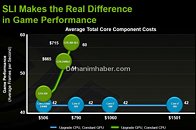- Joined
- Oct 9, 2007
- Messages
- 47,853 (7.39/day)
- Location
- Dublin, Ireland
| System Name | RBMK-1000 |
|---|---|
| Processor | AMD Ryzen 7 5700G |
| Motherboard | Gigabyte B550 AORUS Elite V2 |
| Cooling | DeepCool Gammax L240 V2 |
| Memory | 2x 16GB DDR4-3200 |
| Video Card(s) | Galax RTX 4070 Ti EX |
| Storage | Samsung 990 1TB |
| Display(s) | BenQ 1440p 60 Hz 27-inch |
| Case | Corsair Carbide 100R |
| Audio Device(s) | ASUS SupremeFX S1220A |
| Power Supply | Cooler Master MWE Gold 650W |
| Mouse | ASUS ROG Strix Impact |
| Keyboard | Gamdias Hermes E2 |
| Software | Windows 11 Pro |
Ahead of the bulk of the crucial summer shopping season, NVIDIA sent a circular urging consumers to focus their PC upgrades on GPUs, rather than CPU and its platform. It thinks that if you have a reasonably good platform from last year or the year before, a GPU upgrade serves as a better price for performance increment when it comes to games. A slide explaining NVIDIA's advice was leaked (perhaps ahead of its formal publication, as it seems to be targeted at end-users and not intermediate customers or distributors).
Quite simply, the slide shows how upgrading the GPU is a more cost-effective way of increasing performance of a gaming PC, compared to upgrading the platform (CPU, compatible motherboard and memory). The side specifically targets the Intel Core i7 platform, and pits the upgrade path against upgrading the graphics components, keeping the rest of the PC constant, based on the common Core 2 Duo E8400. The price of this base system along with a GeForce GTS 250 GPU is measured at $506. A $159 upgrade to GeForce GTS 250 SLI sends the average FPS (application not mentioned) up to 54 from 42, likewise as you look further up the options NVIDIA provides. Upgrading the rest of the platform is making no performance impact on this application. The general idea conveyed is that for a gaming PC with recent generation hardware, better graphics is a better incremental upgrade. Choose with your wallet.

View at TechPowerUp Main Site
Quite simply, the slide shows how upgrading the GPU is a more cost-effective way of increasing performance of a gaming PC, compared to upgrading the platform (CPU, compatible motherboard and memory). The side specifically targets the Intel Core i7 platform, and pits the upgrade path against upgrading the graphics components, keeping the rest of the PC constant, based on the common Core 2 Duo E8400. The price of this base system along with a GeForce GTS 250 GPU is measured at $506. A $159 upgrade to GeForce GTS 250 SLI sends the average FPS (application not mentioned) up to 54 from 42, likewise as you look further up the options NVIDIA provides. Upgrading the rest of the platform is making no performance impact on this application. The general idea conveyed is that for a gaming PC with recent generation hardware, better graphics is a better incremental upgrade. Choose with your wallet.

View at TechPowerUp Main Site





 Most (if not all) games nowadays are GPU-limited, especially at high settings.
Most (if not all) games nowadays are GPU-limited, especially at high settings.
